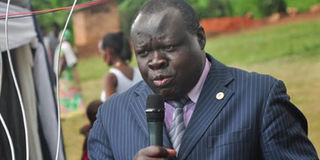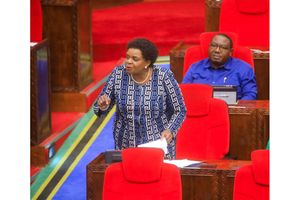EAC climate unit back in operation

What you need to know:
The unit which was established to assist the member countries to adapt climate change and mitigate its effects was closed down on January 20th, 2016 after donors pull out.
Arusha. The East African Community (EAC) climate unit which was closed two years ago, will soon be back in operation.
The unit which was established to assist the member countries to adapt climate change and mitigate its effects was closed down on January 20th, 2016 after donors pull out.
But the EAC deputy secretary general (Productive and Social Sectors), Christophe Bazivamo said on Friday, March 2, that it was now being revived.
"Donors have agreed to support its operations and we expect it will be back in action soon", he told reporters at the sidelines of investor’s roundtable on environment and natural resources management.
The unit, launched in December 2011, was supported by the European Union Commission, the Norwegian government and the United Kingdom's Department for International Development (DfID).
One of its mandates was to assist farmers in the region to implement climate smart agriculture to mitigate impacts of weather vagaries.
The $ 20 million programme was also to be implemented in the Southern Africa Development Community (Sadc) and the Common Market for Eastern and Southern Africa (Comesa) blocs.
Speaking during the forum which focused on the conservation of resources within the Lake Victoria basin, Mr Bazivamo called for increased private sector involvement in addressing challenges of climate change.
"There has been less involvement of the private sector. Yet this can enable them do business and improve livelihood of the people", he said.
He told participants from all over the region and development partners that droughts and water scarcity were the main causes of food insecurity in East Africa.
That is in addition to pests and crop diseases, deforestation, land degradation and bad agricultural practices.
He stressed the need for enhanced conservation programmes, noting that 60 per cent of agriculture in EA was directly dependent on rains and 40 per cent from the wetlands, marshes and rivers.
EAC secretary general Liberat Mfumukeko said the EAC and its institutions would do all it could "to protect its natural capital against all forms of pollution and degradation".
For the past five years, the bloc has been implementing a USAid-supported Planning for Resilience in East Africa through Policy, Adaptation, Research and Economic Development (PREPARED) project.
The American aid agency injected $194 million for the project implemented by EAC through the Kisumu-based Lake Victoria Basin Commission (LVBC), according to Dr. Brad Arsenault, its deputy director for EA operations.




